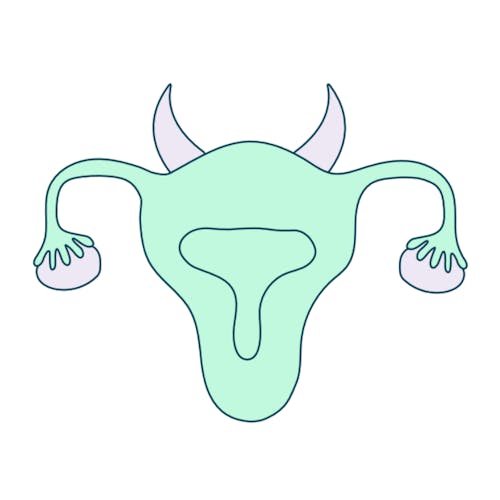This website uses cookies to enhance the user experience. By using Yoppie you are agreeing to our use of cookies.
Menstrual Phase 101 : What symptoms you might experience and how to manage it
Written by Yoppie
30 May 2022
How can I manage symptoms?
What if my menstrual phase changes?
How do I know if something is off?
Next up in our series on the many phases of your menstrual cycle… it’s the menstrual phase itself! This is the one everyone knows about and the easiest to identify each month, but let’s take a closer look at what’s happening in your body, symptoms you might experience, and how to manage each month without cancelling all your plans…
What is the menstrual phase?
To recap from our luteal phase blog, every menstrual cycle goes through the same stages each month; an egg is made (follicular phase) and released from the ovaries (ovulation phase), then the uterine lining thickens to support the egg’s growth (during the luteal phase). If a pregnancy doesn’t occur, the lining of the uterus sheds and… hello menstrual phase!
This phase is when you bleed because the egg from your ovulation phase hasn’t been fertilised or attached to the uterine lining, so levels of oestrogen and progesterone drop and trigger the bleeding to start. It’s a real good time.
What symptoms am I likely to experience?
Like in the luteal phase, you may get much of the same PMS symptoms, just more physical. For example, while mood swings may be the most common PMS symptom, cramps may become the troublesome one in this phase.
Here are some of the emotional symptoms:
- Anxiety
- Low mood, mood swings and irritability
- Changes in appetite and food cravings
- Sleep issues
- Social withdrawal
- Focus issues and brain fog
And here are some of the physical symptoms:
- Joint or muscle aches
- Headaches
- Fatigue
- Weight gain and fluid retention
- Abdominal bloating and cramping
- Breast tenderness
- Acne and skin issues
How can I manage symptoms?
Great question. This phase of your cycle is usually the one that requires most physical TLC as your body goes through a lot. Identifying what your most frustrating symptoms are, whether physical or emotional, will help you prioritise and manage. Try tracking your cycle so you know what’s coming and when each month, and what’s ‘normal’ for you.
Also, don’t forget to use resources to ease discomfort. It’s amazing how many people will suffer through the pain and emotional symptoms without applying the tools available to help. If you have sleep issues, try a sleep aid like chamomile tea before bed. If you get low mood around your period, speak to your doctor. There’s no reason to grin and bear it.
What if my menstrual phase changes?
Throughout life, your menstrual cycle will change, and so will the period itself. This is due to typical hormonal changes that happen with age, and lifestyle factors like medications you may be taking, health issues, and even stress levels - yes, stress can affect your periods!
Your period will change slightly over the years; in your teens it’s all over the place, in your 20s it may become more manageable, in your 30s - if you want children - you may start taking more notice of your cycle and period, in your 40s your periods will probably slow down for perimenopause, then in your 50s+ you can say goodbye to your period once and for all!
These changes are totally OK, but if your period is pretty consistent and then changes out of nowhere from one month to the next, there could be something else going on.
How do I know if something is off?
If you’ve spent any time on the Full Stop blog, you’ll know there are a thousand symptoms that could signify something is wrong with your period. From irregular periods to spotting to excess blood clots to odd smelling discharge and so on, each symptom could mean something different. Here are some common period symptoms to watch out for, and why:
- Skipped periods - If your periods stop and you know you aren’t pregnant, this could be due to a number of things, such as drastic weight loss, overexercising, stress, polycystic ovary syndrome (PCOS), or perimenopause.
- Heavy bleeding - Some people experience a heavy flow every month as standard, but if it comes out of nowhere it could be a sign of a condition like PCOS, an underactive thyroid gland, fibroids or polyps (noncancerous growths in the uterus), endometriosis, adenomyosis, or pregnancy complications. In some cases it can be a sign of cancer, so it’s best to get it checked by a doctor to rule this out.
- Intense cramps - While cramps are normal during your period (because of all the uterine lining being shed and what-not) and typically start a day or two before your period arrives. However, they shouldn’t be severe enough to stop you taking part in daily activities as normal. Painful cramps can be a sign of an IUD issue, fibroids, endo, adenomyosis, a sexually transmitted disease (STD) or even pelvic inflammatory disease (PID). It’s best to see a doctor to find out more about cramps.
- Bleeding between periods - Sometimes called ‘spotting’, bleeding between periods can be a sign of something as simple as a new type of birth control (or skipping some birth control pills), or it could be more serious, like an STD, PCOS, uterine polyps or fibroids, or something else. It’s always best to check any concerns with your doctor.
Want to know what phase of your cycle you’re in? Our website has a short Learn Your Phase questionnaire to help. We love helping people figure out what’s going on with their body through the entire cycle - not just the bleed days - so whatever your symptoms or cycle goals are, you should take a look. And if you have questions about the menstrual phase, ask over in our Full Stop FB group or get in touch directly on IG at @itsyoppie.
Don't forget that our personalised menstrual cycle subscription box can get organic tampons, PMS supplements and much more delivered easily and regularly through your letterbox, to give you just a bit more peace of mind each cycle.
Section jump
Back to top
Subscribe To Our Newsletter
YOPPIE





© 2026 Yoppie is a registered trademark of Phlo Technologies Ltd.
Yoppie's supplements are not a substitute for a varied diet and healthy lifestyle and are not intended to diagnose, treat, or cure any disease. If you are pregnant, breastfeeding, have a medical condition or are under medical supervision, please consult with your doctor before taking any of our products.






